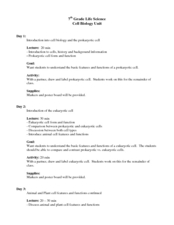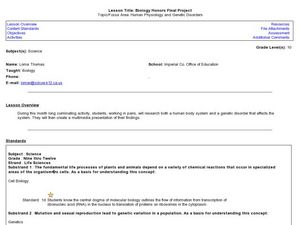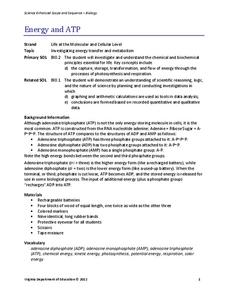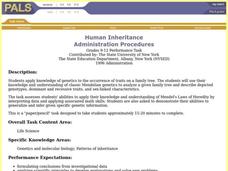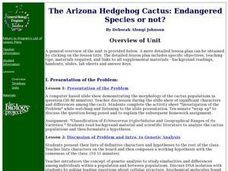Virginia Department of Education
Cell Parts
What do a bird, an egg, a rabbit, and a toad all have in common? This fun-filled resource explains the similarities and differences between cells and how all cells are similar, yet all are different. Learners begin by depicting a...
Virginia Department of Education
The Cell Cycle and Mitosis
What a packed lesson! Provide your class with the opportunity to learn about the cell cycle in several exciting ways. Biologists first learn about the theory behind mitosis, then proceed to view onion tips under the microscope and create...
Serendip
The Molecular Biology of Mutations and Muscular Dystrophy
Different types of mutations cause unique types and degrees of muscular dystrophy. Scholars learn about the types of mutations and the impact on the body. They compare the location of the mutations and draw conclusions about how it is...
Curated OER
Cell (Biology)
Students conduct a series of activities to explore the nature of cells. In this biology instructional activity, students observe plant and animal cells under the microscope and compare them. They differentiate osmosis and diffusion.
Curated OER
How Mutations Lead to Changes in Cell Structure and Function
Students investigate how mutations lead to changes in cell structure and function. They construct an oligonucleotide, identify a protein sequence, design a step-by-step mechanism of how they think cells repair damaged DNA, and prepare...
Virginia Department of Education
Structure and Function of Cell Membranes
Lead your high school class on an exploration inside the cell. Individuals investigate the relationships between cells structure and function given their relative locations on the cell membrane. They explore the concept of homeostasis...
Serendip
Using Molecular and Evolutionary Biology to Understand HIV/AIDS and Treatment
HIV mutates rapidly, making treatments challenging to find. Scholars learn about why it mutates so quickly and how scientists race to find treatments. The resource approaches the issue from both a molecular and evolutionary perspective...
Serendip
Understanding the Biology of Cancer
After initial exposure to a carcinogen, a cancer diagnosis often takes more than a decade due to the slow buildup of mutated cells in the body. Scholars learn about the biology of cancer with a worksheet and discussion questions. They...
Curated OER
Games and Activities to Teach Molecular Genetics
Students demonstrate a working knowledge of cell interactions such as DNA replication, protein synthesis (transcription and translation), through active participation in a cooperative group.
Curated OER
Genetics and Molecular Biology
Students create DNA models using colored construction papers. In this biology lesson plan, students identify enzyme restriction sites. They model how DNA plasmids replicate when taken up by a bacterial cell.
Curated OER
Osmosis and Diffusion: Egg Lab
Students examine why diffusion and osmosis happen in an egg cell. In this diffusion lesson plan students demonstrate a semi permeable membrane.
Curated OER
Biology Honors Final Project
Tenth graders work on a project about cellular biology and genetics. In this biology lesson, 10th graders research about the assigned human body system and genetic disorders that affect it. They create a multimedia presentation and...
Virginia Department of Education
Prokaryotes
Lead your biology class on a cell-sized adventure! Emerging scientists construct models of prokaryotes, then design an experiment to properly grow a bacterial culture. They conclude the activity by viewing the culture under a microscope....
Curated OER
DNA Extraction from Yeast Cells
Young scholars explore DNA. They work in groups and mix prepared detergent/ salt solution, meat tenderizer solution, Fleischman's yeast and water to extract DNA from yeast. Observations are recorded.
Curated OER
PROTOPLAST PRODUCTION
High schoolers are allowed to strip away the cell walls of plants cells (using enzymes) and then observe the resulting spherical protoplasts (plant cells minus the cell wall). They see that plants cells indeed have a plasma membrane in...
Serendip
From Gene to Protein - Transcription and Translation
Learners identify the different steps involved in DNA transcription. In this genetics lesson, pupils complete a worksheet and model the translation process with a paper chain activity. They watch a video on sickle cell anemia and explain...
Curated OER
How Things Go Wrong
Students identify where mutations might occur and examine what effect those mutations will have through class discussion of DNA replication and cell division. Students then differentiate between mutations that affect individuals and...
Virginia Department of Education
Energy and ATP
Take charge of your biology class by using this exciting analogy to relate the ATP process with batteries. Pupils use batteries and rubber bands to simulate the phosphate bonds between molecules in the body. They measure the distance in...
Curated OER
Human Inheritance
Students analyze genetic characteristics in a given family tree through the F2 generation. Students apply prior knowledge from Gregor Mendel's study with pea plants and his Laws of Heredity to answer questions.
Curated OER
The Case of Regulation in Cells
After your biologists have learned about transcription, translation, and gene regulation, they work in a small group to create a poster of a system that serves as an analogy of the gene regulation process. They share their creations with...
Curated OER
The Arizona Hedgehog Cactus: Endangered Species or not?: Biology, Plants
In this lesson students will study the: "Classification of Echinocereus triglochidiatus and Geographical Ranges of its Varieties." Students read background material and scientific literature to analyze the cactus populations and then...
National Center for Case Study Teaching in Science
Identical Twins, Identical Fates?
Can different personal experiences affect our genes? Find out in an intriguing case study about one twin who is diagnosed with mental illness and her identical twin who fears she may suffer the same fate. Designed for college-level...
Serendip
UV, Mutations, and DNA Repair
How effective are cells at repairing UV damage? An inquiry-based instructional activity has learners experiment with organism by exposing them to various levels of UV light and then examining their DNA after a period of time. Pupils test...
Curated OER
Who am I and Why?
Students make comparisons about themselves and others, which are real and meaningful. They study some basic concepts in the area of genetics and do a complimentary series of experiments, or explorations that illustrate these concepts





